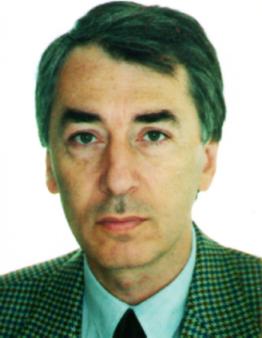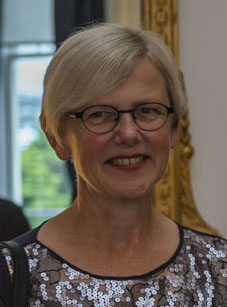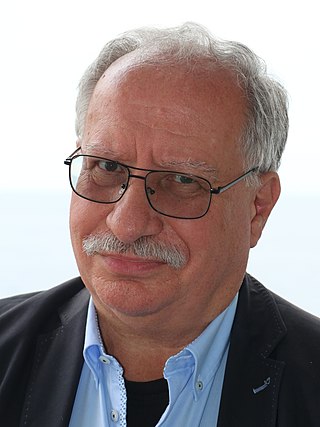
Bjarne Stroustrup is a Danish computer scientist, known for the development of the C++ programming language. He led the Large-scale Programming Research department at Bell Labs, served as a professor of computer science at Texas A&M University, and spent over a decade at Morgan Stanley while also being a visiting professor at Columbia University. Since 2022 he has been a full professor at Columbia.

A cryptographic hash function (CHF) is a hash algorithm that has special properties desirable for a cryptographic application:
In compiler optimization, register allocation is the process of assigning local automatic variables and expression results to a limited number of processor registers.
Algorithmic information theory (AIT) is a branch of theoretical computer science that concerns itself with the relationship between computation and information of computably generated objects, such as strings or any other data structure. In other words, it is shown within algorithmic information theory that computational incompressibility "mimics" the relations or inequalities found in information theory. According to Gregory Chaitin, it is "the result of putting Shannon's information theory and Turing's computability theory into a cocktail shaker and shaking vigorously."

Kurt Mehlhorn is a German theoretical computer scientist. He has been a vice president of the Max Planck Society and is director of the Max Planck Institute for Computer Science.

In computer science, a fingerprinting algorithm is a procedure that maps an arbitrarily large data item to a much shorter bit string, its fingerprint, that uniquely identifies the original data for all practical purposes just as human fingerprints uniquely identify people for practical purposes. This fingerprint may be used for data deduplication purposes. This is also referred to as file fingerprinting, data fingerprinting, or structured data fingerprinting.
The European Joint Conferences on Theory and Practice of Software (ETAPS) is a confederation of (currently) four computer science conferences taking place annually at one conference site, usually end of March or April. Three of the four conferences are top ranked in software engineering and one (ESOP) is top ranked in programming languages.

Forestry in New Zealand has a history starting with European settlement in the 19th century and is now an industry worth seven percent of annual revenue. Much of the original native forest cover was burnt off and logged, however forests have been extensively planted, predominantly with fast-growing cultivars of the Monterey Pine. Wood chips, whole logs, lumber and paper products are exported from New Zealand.

Peter Ružička was a Slovak computer scientist and mathematician who worked in the fields of distributed computing and computer networks. He was a professor at the Comenius University, Faculty of Mathematics, Physics and Informatics working in several research areas of theoretical computer science throughout his long career.
Massive Online Analysis (MOA) is a free open-source software project specific for data stream mining with concept drift. It is written in Java and developed at the University of Waikato, New Zealand.

Monika Henzinger is a German computer scientist, and is a former director of research at Google. She is currently a professor at the Institute of Science and Technology Austria. Her expertise is mainly on algorithms with a focus on data structures, algorithmic game theory, information retrieval, search algorithms and Web data mining. She is married to Thomas Henzinger and has three children.

Ian Hugh Witten was a computer scientist at the University of Waikato, New Zealand. He was a Chartered Engineer with the Institute of Electrical Engineers.

Gillian Christine Dobbie is a New Zealand computer scientist. She is a professor at the University of Auckland and the Director of the Auckland ICT Graduate School. She is also a visiting professor at National University of Singapore and on the advisory board of the Victoria University of Wellington.

Klaus Peter Jantke is a German mathematician, computer scientist, university teacher and academic researcher focusing on Artificial intelligence, Educational technology, Game studies and gamification.

Marie-France Sagot is a researcher at the French Institute for Research in Computer Science and Automation (INRIA) and responsible for the INRIA European team ERABLE. She is also a member of staff at Claude Bernard University Lyon 1.
Oded Regev is an Israeli-American theoretical computer scientist and mathematician. He is a professor of computer science at the Courant institute at New York University. He is best known for his work in lattice-based cryptography, and in particular for introducing the learning with errors problem.
Runtime predictive analysis is a runtime verification technique in computer science for detecting property violations in program executions inferred from an observed execution. An important class of predictive analysis methods has been developed for detecting concurrency errors in concurrent programs, where a runtime monitor is used to predict errors which did not happen in the observed run, but can happen in an alternative execution of the same program. The predictive capability comes from the fact that the analysis is performed on an abstract model extracted online from the observed execution, which admits a class of executions beyond the observed one.
The International Symposium on Experimental Algorithms (SEA), previously known as Workshop on Experimental Algorithms (WEA), is a computer science conference in the area of algorithm engineering.

Priscilla M. Wehi is a New Zealand ethnobiologist and conservation biologist. As at July 2021 she is an associate professor at the University of Otago and on the first of that month officially undertook the role of director of Te Pūnaha Matatini, a centre of research excellence in complex systems and data analytics. During the COVID-19 pandemic in New Zealand Te Pūnaha Matatini scientists have developed mathematical models of the spread of the virus across the country that influence the New Zealand government's response to the outbreak. In 2021 Wehi was awarded the Hill Tinsley Medal.
Jacqueline Louise Whalley is a New Zealand academic, and is a full professor at the Auckland University of Technology, specialising in software engineering and computer science education.











